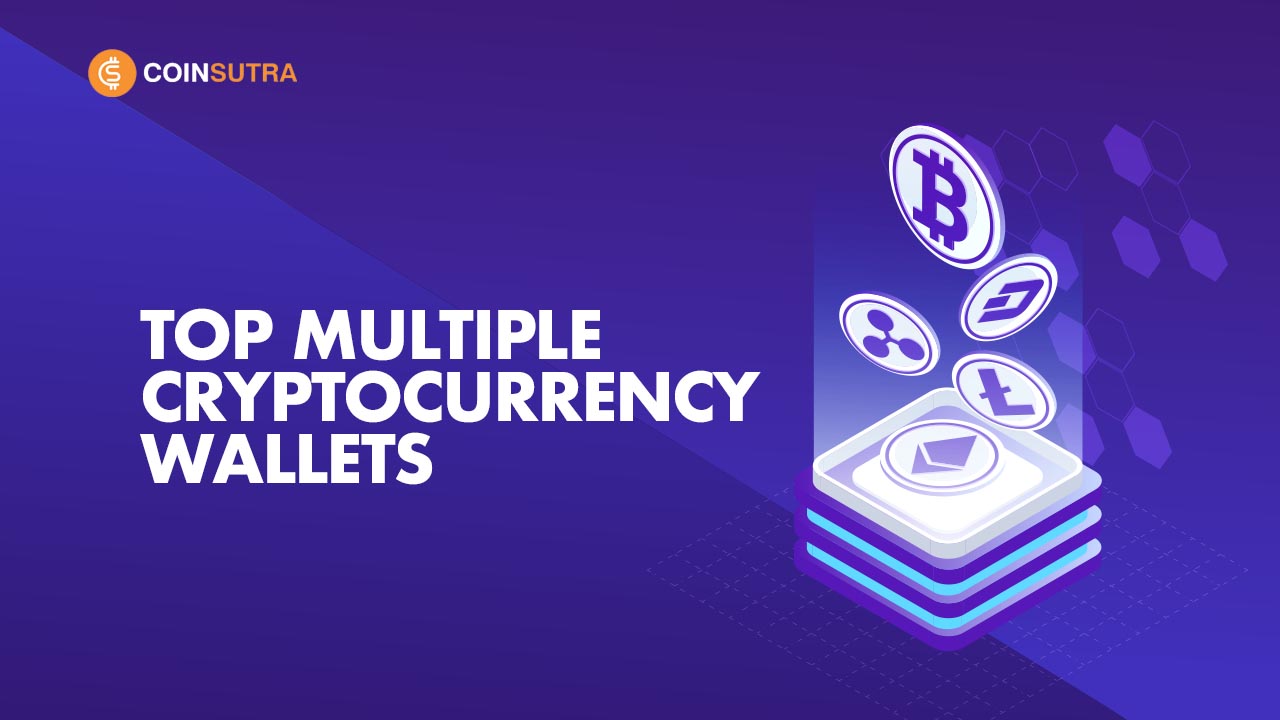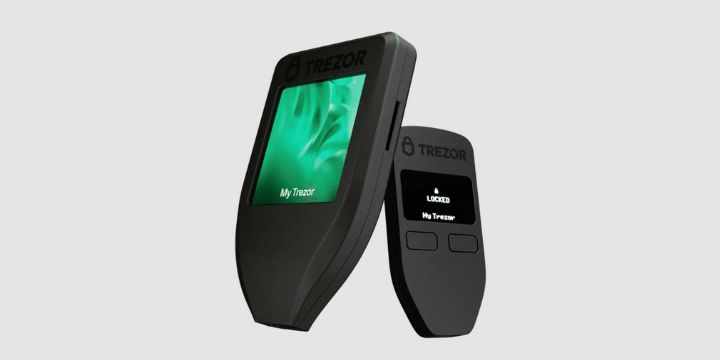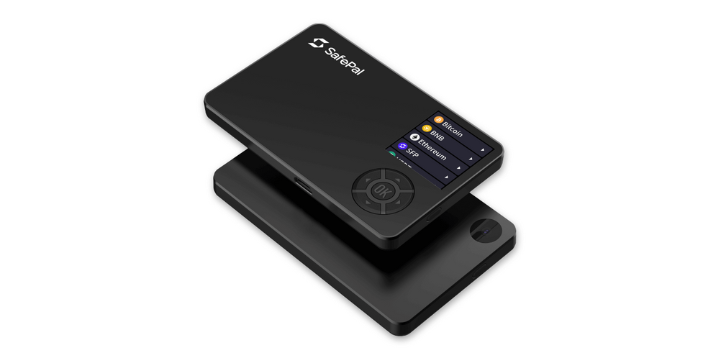Managing different cryptocurrencies can be tricky, especially when you need a safe and easy way to store them. The multi-currency crypto wallet helps you keep all your digital coins in one place. It supports many types of coins, like Bitcoin, Ethereum, and more, across various blockchains.
These wallets are simple to use and offer strong security features to keep your assets safe. In this guide, we will explore the best multi-cryptocurrency wallets for 2024, helping you choose the right option for your needs.
Key Takeaways:
- A multi-currency wallet is a digital tool that enables you to securely manage and store multiple cryptocurrencies across different blockchains from a single dashboard.
- The best multi-cryptocurrency wallets are Coinbase Wallet, Trust Wallet, Crypto.com DeFi Wallet, Exodus, MetaMask, Ledger Nano S Plus, Trezor Model T, and SafePal S1 due to their support for numerous coins and blockchains.
- To choose the best multiple-currency crypto wallet, consider factors like security features, supported cryptocurrencies, ease of use, platform compatibility, fees, and wallet type (hot or cold).
List of Top Multi-Cryptocurrency Wallets
We have reviewed over 30 crypto wallets, including software wallets and hardware wallets based on supported coins and blockchains, ease of use, price, trading features, and more. Here is our list of the top 8 best multi-currency crypto wallets:
- Coinbase Wallet: Overall best multi-cryptocurrency wallet for beginners
- Trust Wallet: Top multi-crypto wallet with vast asset support
- Crypto.com DeFi Wallet: Best for DeFi users with multi-chain support
- Exodus Wallet: User-friendly wallet with built-in crypto exchange
- MetaMask: Top multi-currency wallet for Ethereum and Web3 interactions
- Ledger Nano S Plus: Safest multi-currency hardware wallet with cold storage
- Trezor Model T: Advanced multi-cryptocurrency hardware wallet with Shamir backup
- SafePal S1: Affordable multi-chain hardware wallet with offline security
Best Multi-Cryptocurrency Wallets: Reviewed
1. Coinbase Wallet
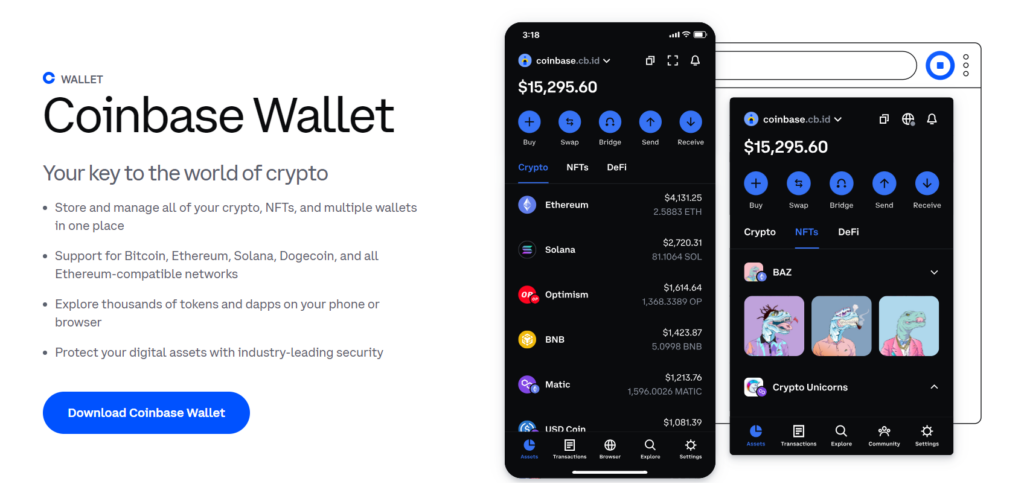
Coinbase Wallet is our #1 choice as a secure and user-friendly multi-cryptocurrency wallet. Unlike the Coinbase app, which holds your crypto for you, Coinbase Wallet is a self-custody wallet. This means you control your private keys, giving you direct access to your funds. You can use it to store, send, and receive thousands of cryptocurrencies, including major ones like Bitcoin, Ethereum, and all ERC-20 tokens.
The Coinbase Wallet is available on mobile and as a browser extension, but there is no desktop version. One of its key features is the ability to interact with decentralized apps (dApps) and NFT platforms directly, making it a good choice if you’re interested in DeFi. The wallet also integrates with hardware wallets like Ledger, offering you the option to securely store your crypto offline.
With Coinbase Wallet, you can also transfer assets from Coinbase’s exchange to your own wallet. Users who desire hot storage for multiple cryptocurrencies and blockchains while maintaining access to DeFi services can utilize it. Users who desire hot storage for multiple cryptocurrencies and blockchains while maintaining access to DeFi services can utilize it.
Pros of Coinbase Wallet
- Supports thousands of cryptocurrencies and tokens, including NFTs
- Support for Bitcoin, Ethereum, Solana, Dogecoin, and all Ethereum-compatible networks
- Compatible with hardware wallets such as Ledger for cold storage
- Provides access to Web3 applications and DeFi liquidity pools
- User-friendly for both beginners and experienced crypto users
Cons of Coinbase Wallet
- No desktop version, only available on mobile and browser extensions
- The software is not fully open-source, which could raise transparency concerns
2. Trust Wallet
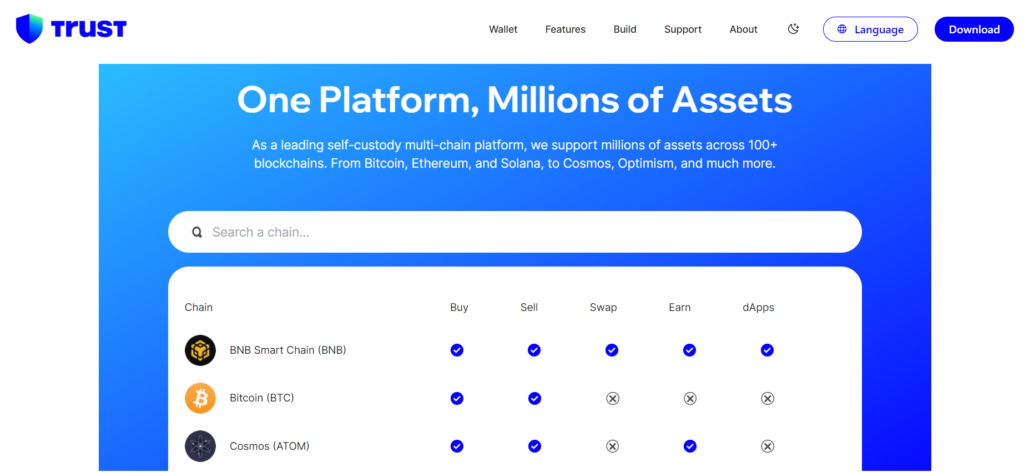
Trust Wallet is a popular multi-cryptocurrency wallet that supports over 10 million digital assets across 100+ blockchains, including major coins like Bitcoin, Ethereum, Solana, and Binance Coin.
Launched in 2017 and later acquired by Binance in 2018, Trust Wallet has been downloaded by more than 100 million users globally. It is a non-custodial wallet, meaning you retain full control of your private keys, providing enhanced security.
Trust Wallet is available as a mobile app (iOS and Android) and as a browser extension for platforms like Chrome and Brave. It allows you to store, buy, sell, swap, and stake various cryptocurrencies directly within the app.
The wallet also supports decentralized applications (dApps) and non-fungible tokens (NFTs), making it a versatile hub for Web3 interactions. With built-in staking for 24+ coins, users can earn rewards directly from the app. Security is emphasized with features like biometric authentication, encrypted backups, and secure cloud storage for private keys. Read our complete Trust Wallet review here.
Pros of Trust Wallet
- Supports over 10 million digital assets across 100+ blockchains
- Integration with Ledger hardware wallets for enhanced protection
- Staking support for 24+ cryptocurrencies, including popular coins like BNB and Polkadot
- User-friendly interface with in-app crypto purchases and swaps
- Cross-platform support (mobile and browser extensions)
Cons of Trust Wallet
- Limited customer support; mostly FAQs and chatbot
- Hot wallet, inherently less secure than cold storage
3. Crypto.com DeFi Wallet
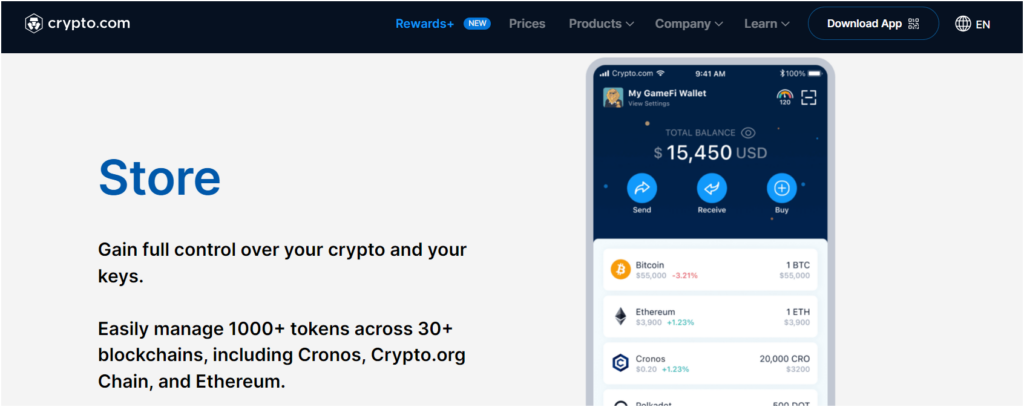
Crypto.com DeFi Wallet is a non-custodial cryptocurrency wallet that empowers you to securely store and manage your digital assets. As the sole custodian of your private keys, you retain complete ownership and control over your cryptocurrencies. The wallet supports over 1,000 tokens across more than 30 blockchains, including Cronos, Crypto.org Chain, and Ethereum.
Beyond storage, the DeFi Wallet enables seamless interaction with decentralized finance (DeFi) applications. You can effortlessly swap tokens, participate in staking, and engage with various DeFi protocols directly through the app. Additionally, it supports non-fungible tokens (NFTs), allowing you to manage and showcase your NFT collection within the wallet.
It is secure with features like biometric authentication and two-factor authentication (2FA). The app is available for iOS, Android, and desktop via a browser extension. You can even import existing wallets from other platforms like MetaMask or Ledger by using a 12/18/24-word recovery phrase.
Pros of Crypto.com DeFi Wallet
- Supports over 1,000 tokens across more than 30 blockchains
- Interact with various DeFi applications, enabling staking, token swaps, and more
- Allows for easy management and viewing of NFTs within the wallet
- Migrate assets between different chains with the in-app bridging feature
- Earn staking rewards on 25+ tokens, including CRO, TONIC, ATOM, and stablecoins
Cons of Crypto.com DeFi Wallet
- Some users have reported challenges with customer service responsiveness
- Newcomers to DeFi may find the array of features overwhelming initially
4. Exodus Wallet
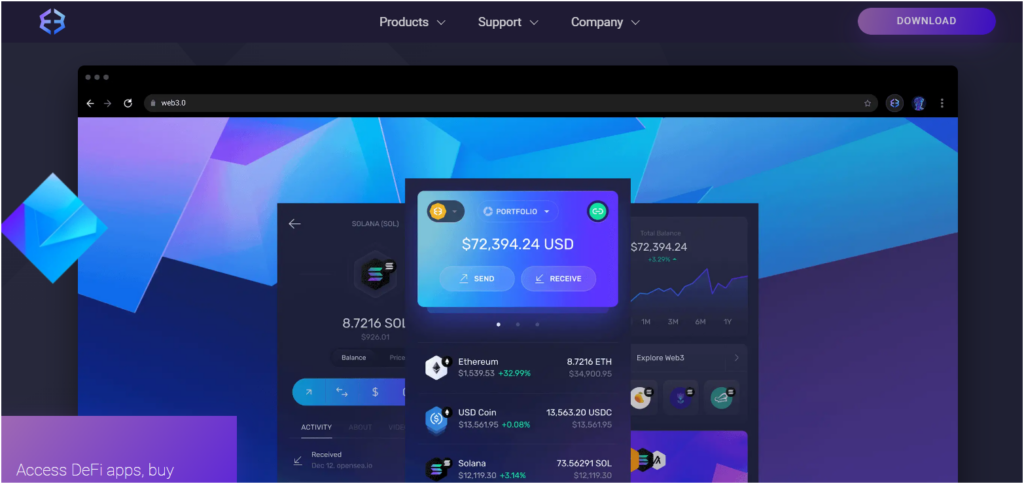
Exodus Wallet is one of the most popular multi-cryptocurrency wallets, known for its user-friendly interface and extensive features. Launched in 2015, Exodus is a hot wallet that supports over 1000 cryptocurrencies on 50+ blockchains, including the BNB chain, Ethereum, Solana, and many ERC-20 tokens. The wallet is available on desktop (Windows, Mac, and Linux) and mobile devices (iOS and Android) and can be paired with the Trezor hardware wallet for added security.
Exodus provides built-in exchange functionality, allowing you to swap between thousands of cryptocurrency pairs without leaving the app. One standout feature is its real-time portfolio tracker, which helps users manage and monitor their assets with live price charts.
The wallet also includes staking for several assets, such as Cardano (ADA), so users can earn rewards. With Exodus, your private keys are stored locally on your device and encrypted, ensuring that you retain full control over your funds.
Pros of Exodus Wallet
- Simple for beginners to use and navigate
- 50+ crypto networks supported for multi-chain holders
- Buy crypto using your credit/debit card, bank account, Apple Pay, or Google Pay
- Access DeFi apps, buy NFTs, and explore Web3 within the app
- Connect with Trezor for crypto cold storage
Cons of Exodus Wallet
- Does not have multi-signature support
- Some parts of the code are proprietary (not fully open-source)
5. MetaMask
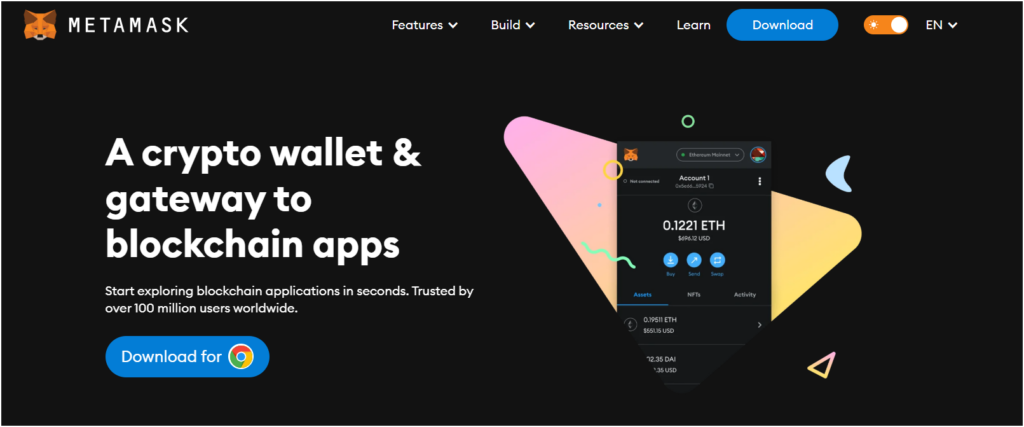
MetaMask is a popular software wallet that securely stores, manages, and interacts with Ethereum-based assets and decentralized applications (dApps). Launched by ConsenSys in 2016, it has become one of the go-to wallets for decentralized finance (DeFi) and Web3 communities, boasting over 100 million active users worldwide.
MetaMask is available both as a browser extension (for Chrome, Firefox, and other browsers) and as a mobile app (for iOS and Android). It supports Ethereum (ETH) and a wide array of ERC-20 tokens, including 450,000+ tokens, such as USD Coin (USDC) and Tether (USDT). It also allows users to hold and trade NFTs.
It can connect with dApps across different blockchains like Ethereum, BNB Smart Chain (BSC), Polygon, and Avalanche. It also includes an in-built swap feature that lets users exchange tokens within the wallet by leveraging liquidity from decentralized exchanges like Uniswap and Curve. A recent addition, MetaMask Portfolio, lets users track their multi-chain assets in one place.
Pros of MetaMask
- Supports multiple networks like Ethereum, BSC, Polygon, and more
- Access decentralized exchanges directly in the app
- Best for DeFi services like staking and yield farming
- Easy connectivity with sites like OpenSea and Uniswap
- Easy-to-use mobile app for both Android and iOS devices
Cons of MetaMask
- Doesn’t support Bitcoin (BTC) storage (only supports WBTC)
- High gas fees, especially on congested networks like Ethereum
- Multi-chain setup needs to be done manually
6. Ledger Nano S Plus
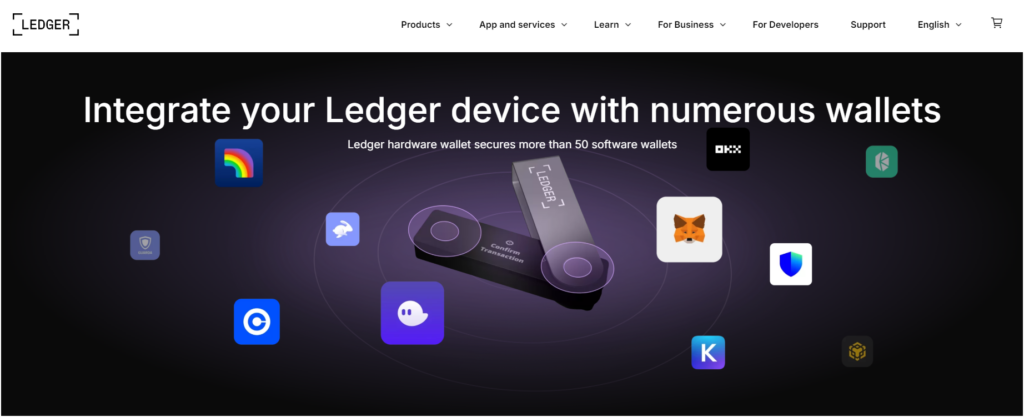
The Ledger Nano S Plus is a top-tier multi-cryptocurrency hardware wallet designed for enhanced security and usability. This wallet allows you to manage over 5,500 coins and tokens. It also supports NFTs, making it a versatile option for crypto enthusiasts involved in various blockchain ecosystems.
One of the key improvements over its predecessor, the Ledger Nano S, is its larger screen, which makes navigating the interface easier and helps verify transaction details more clearly. The Nano S Plus also boasts more memory, allowing you to install up to 100 cryptocurrency apps simultaneously. This is a major upgrade compared to the older model’s limited app capacity.
The Ledger hardware wallet is highly safe, featuring a CC EAL6+ certified secure element chip and physical buttons for confirming transactions. This ensures that private keys remain offline, safeguarding against online hacks. It also integrates with Ledger Live, a companion app that enables users to manage assets, send and receive transactions, and engage in DeFi and staking services, all from one platform.
Pros of Ledger Nano S Plus
- Supports over 5,500 cryptocurrencies and tokens, including NFTs
- Secure offline storage with a CC EAL6+ chip
- Can install up to 100 apps simultaneously
- Regular firmware updates enhance security and add features
- Supports more than 50 software wallets for integration
Cons of Ledger Nano S Plus
- Lacks a battery, so it needs to be plugged in for use
- Does not support as many coins as hot wallets like Coinbase Wallet or Trust Wallet
- Smaller displays may be inconvenient for some users
7. Trezor Model T
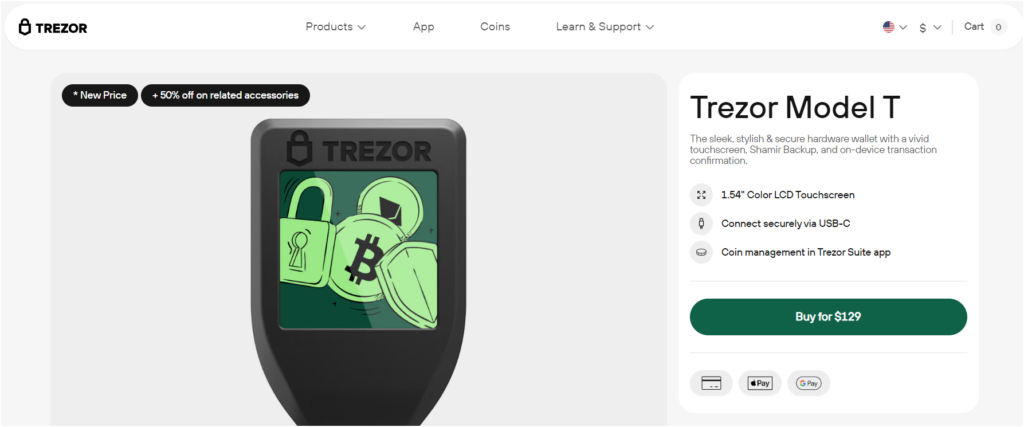
Trezor Model T is another multi-cryptocurrency cold wallet for offline crypto storage. It boasts a 1.54-inch color touchscreen, allowing for smooth interaction directly on the device. This hardware wallet supports over 1,000 cryptocurrencies, including Bitcoin, Ethereum, and many ERC-20 tokens. The Model T connects via USB-C and integrates with the Trezor Suite app, where you can send, receive, stake, and trade your assets securely.
A key feature is its enhanced backup and recovery options, including a 12-word recovery seed and the Shamir Backup system, which adds an extra layer of protection. The wallet’s open-source design ensures transparency, and it includes strong security protocols like PIN entry, passphrase protection, and two-factor authentication (FIDO2). Plus, you can manage privacy settings using features like Tor integration and coin control.
In terms of technical specifications, the Trezor Model T is powered by a 180 MHz ARM Cortex-M4 processor and weighs just 22 grams. Its durable build is complemented by safety certifications such as CE and RoHS.
Pros of Trezor Model T
- High security with features like open-source design, Shamir Backup, and on-device PIN/passphrase entry
- Tor and coin control support for enhanced privacy
- Works with third-party wallets like MetaMask and Exodus
- Manages over 1,000 coins and tokens
Cons of Trezor Model T
- No secure element chip for security
- The buying price of $129 can be higher than other hardware wallets like Ledger Nano S Plus ($79)
8. SafePal S1
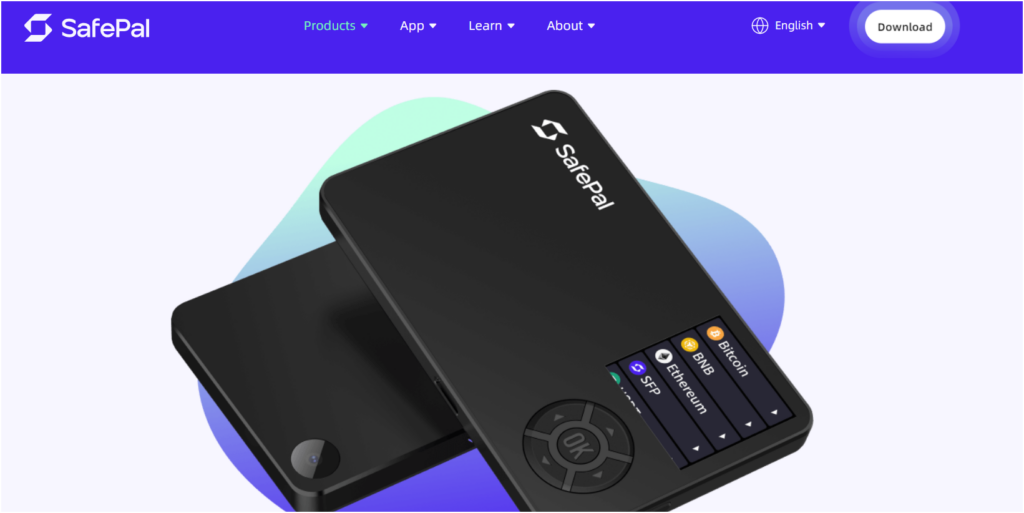
The SafePal S1 is the cheapest hardware wallet designed to store and manage multiple cryptocurrencies completely offline. Priced at around $49.99, it’s one of the most affordable options. The wallet uses air-gapped technology, which ensures it never connects to the internet, eliminating risks from Wi-Fi, Bluetooth, or USB-based attacks. All transactions are done via QR code using a built-in camera.
Key security features include an EAL 5+ secure element chip, typically used in sensitive industries like banking, and an anti-tampering self-destruct mechanism. If any physical tampering is detected, the device will automatically erase all private keys, ensuring your assets remain safe.
The S1 supports over 10,000 cryptocurrencies and more, along with integration for NFTs and DeFi activities through the SafePal App. With a 400mAh rechargeable battery lasting up to 20 days and its lightweight-portable design, it’s both convenient and durable. The wallet comes with a 1.3″ color screen for clear transaction verification and is compatible with iOS, Android, Windows, and MacOS. It also supports a direct connection to the Binance DEX for offline trading. Here is our detailed SafePal S1 review.
Pros of SafePal S1
- Completely offline with air-gapped technology
- Strong security with EAL 5+ secure element and self-destruct feature
- Supports over 10,000 cryptocurrencies and NFTs
- Affordable price point at $49.99
- Lightweight and portable with a 400mAh battery lasting up to 20 days
Cons of SafePal S1
- Lacks advanced connectivity options like Bluetooth
- No touchscreen (relies on D-pad controls)
What Is a Multi-Cryptocurrency Wallet?
A multi-cryptocurrency wallet is a digital tool that allows users to store, manage, and transact with multiple types of cryptocurrencies in a single interface.
Unlike wallets that only support one specific coin, a multi-crypto wallet can hold various digital currencies, such as Bitcoin, Ethereum, Litecoin, Solana, etc. These wallets can be software-based (mobile or desktop applications) or hardware-based (physical devices).
The primary function of a multi-cryptocurrency wallet is to give users a convenient and efficient way to keep track of their diverse cryptocurrency holdings across multiple blockchains.
Advantages of Using a Multi-Cryptocurrency Wallet
- Convenience: It offers the convenience of managing multiple cryptocurrencies in one place. Instead of juggling different wallets for each coin, you can access all your assets from a single application.
- Lower Costs: Using multi-crypto wallets results in lower transaction fees compared to using multiple wallets. By consolidating your assets, you can reduce the number of transactions and associated fees, saving you money in the long run.
- Portfolio Tracking: A multi-cryptocurrency wallet can track your entire portfolio from a single dashboard. You can easily see the performance of all your digital assets at a glance.
- Less Time-Consuming: Managing all your cryptocurrencies from a single wallet saves you time. Instead of checking multiple wallets to monitor your investments, you can quickly access everything you need in one place.
Disadvantages of Using a Multi-Cryptocurrency Wallet
- Security Risks: Using a single multi-currency wallet can pose a security risk. If the wallet gets hacked, you could lose access to all your assets at once. In contrast, if you use different wallets for various cryptocurrencies, a hack affecting one wallet won’t compromise your entire portfolio.
- Complexity in Management: Managing various cryptocurrencies in one wallet can sometimes be complex, particularly for beginners. It may require users to manually add different networks and coins, which can be overwhelming and lead to mistakes.
Factors to Consider When Choosing the Best Multi-Crypto Wallet
When you choose a multi-cryptocurrency wallet, there are several important things to think about. Let’s talk about the key factors to consider when picking the best multi-coin wallet:
#1. Security Measures
When dealing with cryptocurrency, keeping your funds safe is essential. A good multi-cryptocurrency wallet should give you control over your private keys. The cryptocurrency wallets also have two-factor authentication (2FA), which adds an extra security step.
Another useful security feature is backup and recovery options. If you lose your device, you should be able to recover your funds easily by using a seed phrase. This is usually a set of 12 to 24 words that helps you restore your wallet. For even more protection, some wallets also offer multi-signature support.
#2. Supported Cryptocurrencies
There are millions of cryptocurrencies available, though only a few are widely used and others are just speculative or meme coins. Most wallets will support major coins like Bitcoin (BTC), Ethereum (ETH), and Binance Coin (BNB).
But if you want to store smaller, less common tokens, you need to make sure the wallet can handle those too. Mullti-currency crypto wallets like Trust Wallet and MetaMask support over 100,000 crypto trading pairs, making them great options if you hold a wide range of coins.
#3. Ease of Use
A wallet should be simple to navigate, especially if you are new to cryptocurrency. Generally, crypto wallets are designed with beginners in mind, with clear instructions and an easy-to-use interface. The multi-cryptocurrency wallets like Trust Wallet and Coinbase Wallet are known for their straightforward designs.
However, more advanced users might want a wallet that offers detailed features like transaction histories or market data. If the wallet is difficult to use, it can lead to mistakes, like sending funds to the wrong address, so it’s important to choose one that fits your comfort level.
#4. Platform Compatibility
Before choosing a multi-token wallet, check if it works on the devices you plan to use. Some wallets are available as mobile apps, others as desktop software or browser extensions.
Hardware wallets like the Ledger and Trezor offer more security by staying offline, but they might not be as convenient as a mobile app if you want to access your funds quickly. A wallet that works across multiple platforms is ideal for flexibility.
#5. Fees or Price
Most wallets charge a fee when you send or receive cryptocurrency, and sometimes for exchanging between different coins. The crypto wallets, like Coinbase Wallet or MetaMask, let you set your own customizable fees for certain transactions, like those involving Ethereum. If you move funds often, choosing a wallet with low fees will save you money in the long run.
#6. Hot or Cold Wallet
Hot wallets are connected to the internet, which makes them easier to use for daily transactions. However, they are more vulnerable to hacking. Cold wallets, like hardware wallet Ledger Nano S Plus, are offline and offer better security, but they aren’t as fast to use. Your choice between these will depend on how often you plan to trade or transfer your funds.
#7. Extra Trading Features
There are many crypto wallets that offer additional services like staking or lending, which allow you to earn passive income from your crypto. For example, Coinbase Wallet or MetaMask supports staking for several coins. Other multicurrency wallets also have integrated decentralized exchanges, making it easy to trade without leaving the app.
Best Multi-Crypto Wallets: Comparison
| Wallet | Type of Wallet | Supported Coins | Platform Availability | Price |
| Coinbase Wallet | Hot (Non-custodial) | 1,000+ tokens | Mobile (iOS, Android), Browser Extension | Free |
| Trust Wallet | Hot (Non-custodial) | 10 million+ assets across 100+ blockchains | Mobile (iOS, Android), Browser Extension | Free |
| Crypto.com DeFi Wallet | Hot (Non-custodial) | 1,000+ tokens across 30+ blockchains | Mobile (iOS, Android), Browser Extension | Free |
| Exodus Wallet | Hot (Non-custodial) | 1,000+ assets on 50+ blockchains | Desktop wallets (Windows, Mac, Linux), Mobile (iOS, Android) | Free |
| MetaMask | Hot (Non-custodial) | 450,000+ tokens | Browser Extension, Mobile (iOS, Android) | Free |
| Ledger Nano S Plus | Cold (Hardware) | 5,500+ assets, including NFTs | Ledger Live App (Desktop, Mobile) | $79 |
| Trezor Model T | Cold (Hardware) | 1,000+ assets | Trezor Suite (Desktop, Web) | $129 |
| SafePal S1 | Cold (Hardware, Air-gapped) | 10,000+ assets | SafePal App (Mobile, Desktop) | $49.99 |
Conclusion
In a nutshell, selecting the best multi-cryptocurrency wallet for 2024 comes down to your priorities, whether it’s security, ease of use, or advanced crypto trading features.
Wallets like Coinbase and Trust Wallet offer user-friendly interfaces and broad cryptocurrency support, while hardware options like Ledger Nano S Plus provide unmatched security for long-term storage. By choosing a wallet that balances convenience and protection, you can safely manage multiple cryptocurrencies, engage with DeFi applications, and even stake your crypto assets.
Elevate your crypto trading career with CoinWire Trading signals. Get Premium daily signal calls, trading insight, updates about the current market, and analytics about hidden crypto gems now.
FAQs
What are the most popular cryptocurrencies supported by multi-chain wallets?
The most popular multi-chain wallets support major cryptocurrencies such as Bitcoin (BTC), Ethereum (ETH), and Binance Coin (BNB). Many wallets also include support for ERC-20 tokens, Solana (SOL), and stablecoins like USDC and Tether (USDT).
Depending on the wallet, other widely used altcoins like Cardano (ADA), Polkadot (DOT), and Dogecoin (DOGE) are often supported. Some wallets, such as MetaMask and Trust Wallet, offer compatibility with thousands of smaller tokens and DeFi projects across multiple blockchains.
What is the best multicurrency wallet?
The “best” multicurrency wallet depends on your preferences. For ease of use and access to DeFi, wallets like Coinbase Wallet and Trust Wallet are excellent. If security is your top priority, hardware wallets like Ledger Nano S Plus and Trezor Model T are highly recommended.
Can I store multiple cryptocurrencies in one wallet?
Yes, you can store multiple cryptocurrencies in one wallet. Multi-currency wallets like Trust Wallet, MetaMask, and Ledger allow you to store a wide range of digital assets from different blockchains. These wallets are designed to handle multiple tokens, so you don’t need separate wallets for each cryptocurrency.
What are the fees associated with using a multi-chain wallet?
The fees depend on the specific wallet and the blockchain you are using. Wallets like MetaMask allow you to customize fees based on network activity, particularly for Ethereum transactions. Some wallets, like Coinbase Wallet, charge network fees but do not impose extra transaction fees. However, swapping or converting tokens might come with additional charges.
What crypto wallet holds the most coins?
Trust Wallet and MetaMask are among the top wallets supporting the most cryptocurrencies. Trust Wallet allows users to manage over 10 million digital assets across 100+ blockchains, including major coins like Bitcoin, Ethereum, and Binance Coin. MetaMask supports over 450,000 ERC-20 tokens and connects with multiple blockchains like Ethereum, BNB Smart Chain, and Polygon.

